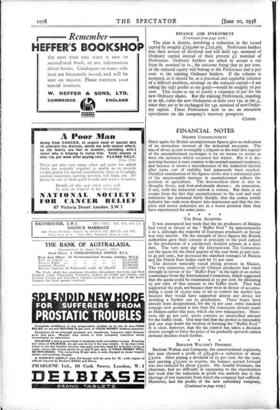Venturers' Corner Without wishing to imply that the shares of
companies which have written down their capital, or contemplate doing so, are always a promising speculation, I invite investors who do not mind taking a risk to look this week at another company which has just reached the reconstruction stage. After incurring losses for many years Tilling-Stevens, the Maid- stone firm of heavy vehicle makers, has again got back to profit-making. In 1936 it made £9,727. The accounts for 1937, which show a further marked improvement, bring news of a profit of £35,336. As substantial orders are in hand and other work is in prospect the board anticipates that factory output will be steady for soma. time to come and therefore feels justified in proposing a capital reorgmisation scheme.
(Continued on page 1078.)
FINANCE AND INVESTMENT
(Continued from page 1076.) The plan is drastic, involving a reduction in the issued capital by roughly ¬£223,000 to ¬£222,565. Preference holders lose their arrears of dividend and will hold 14s. nominal of Ordinary capital instead of their present ¬£i nominal of Preference. Ordinary holders are asked to accept a cut from 8s. nominal to is., the outcome being that 91 per cent. of the reduced equity will belong to the Preference and 9 per cent. to the existing Ordinary holders. If the scheme is accepted, as it should be, as a practical and equitable solution of a difficult problem, earnings on the reduced capital‚ÄĒI am taking the 1937 profits as my guide‚ÄĒwould be roughly 16 per cent. That seems to me to justify a valuation of par for the new Ordinary shares. But the existing Preferences, standing at 9s. 6d., value the new Ordinaries at little over 13s. in the L, since they are to be exchanged for 14s. nominal of new Ordin- ary capital. These Preferences look to mz. an attractive speculation on the company's recovery prospects.
CUSTOS.











































 Previous page
Previous page